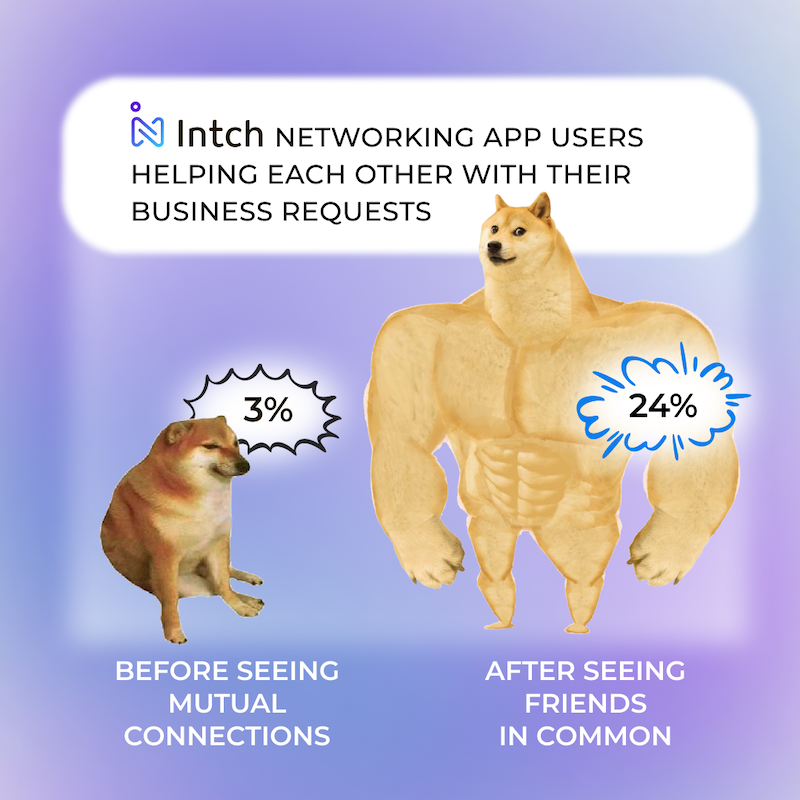In recent months, Microsoft, Amazon, Spotify, Tesla, Netflix, Robinhood, and other companies have all announced job cuts, citing slow economic growth, industry maturity and over-hiring during the pandemic as reasons.
The fastest way to bounce back after a layoff is by tapping into your network, experts believe. “Most highly paid freelance opportunities, jobs, or business opportunities are never advertised,” said Yakov Filippenko, the founder at Intch, an app connecting tech professionals and C-level executives. “They’re filled through networking and referrals. But people are more willing to help with introductions if they see friends in common.”
The startup matches professionals by using AI-based algorithms, allowing users to exchange professional favors. According to Intch data, 24% of people help others if they see that they have mutual connections. In comparison, only 3% respond to cold pitches from complete strangers with “no friends in common”. In that case, how to build an effective network that can help to achieve your professional goals?

The best time to network is when you don’t need it. Many people start networking with a heavy feel of desperation, said Joe Mullings, chairman & CEO of The Mullings Group, which provides hiring strategies for Fortune 100 companies, as well as startups.
“Too many individuals wait until they’re out of a job,” Mullings said. “Networking should be thought of as an interest-bearing account that you should make deposits into on a regular basis.” In fact, it should be weekly, Mullings recommends. Your networking should not be an “ask,” but a give back to your community.
Your former co-workers are an asset. Ryan Yockey, VP of engineering at a food startup, said he reconnected with former colleagues when searching for a job. This approach helped him to land his current position. Former coworkers who recently left are familiar with the changing job market. They may have connections either in their own or other companies that are looking to fill positions. And you have to maintain good relationships with as many people as possible so that you can reach out to them when needed.
“Networking is like having hundreds of conversations at a cocktail party,” Yockey said. “Don’t come right out with the question of looking for a new job. You should develop a rapport and have a natural conversation. The more familiar you become, the easier it will be to let them know you’re searching for a new job when the time comes, and whether they have any leads. You must maintain contact and build trust and relationships over time.”
Be well-informed. By implementing a strategic networking approach, Mike Khorev, managing director at the top SEO agency, has been able to secure regular projects and sign up clients in the tech industry. “Networking has played a crucial role in my success,” Khorev said.
Staying current with industry trends and thought-leadership is crucial for effective networking as well as being prepared to offer solutions or ideas when the opportunity arises. “Typically, I focus on attending events and connecting with key individuals online. Once contact is established, I make a point to follow up regularly and nurture those relationships.”
Networking tips for introverted individuals: Start small. According to Tara Furiani, CEO at the learning and coaching community Not the HR Lady, networking can be daunting for individuals who prefer interacting with computers over humans. However, with a little bit of strategy and preparation, it’s possible to build a professional network that can support your career goals. “Instead of diving headfirst into large networking events, start by connecting with a few individuals online or through small, informal gatherings,” Furiani said.
Furiani also recommends having a plan. “Before attending a networking event, research the attendees and identify individuals you’d like to connect with. This can help you feel more prepared and confident during the event.”
Practicing active listening is also important. “Networking is not just about talking about yourself, it’s also about listening to others. Focus on asking questions and show interest in the people you meet,” Furiani said. “Networking can be draining for introverted individuals, so make sure to take care of yourself before and after events. This can include taking breaks, setting boundaries, and engaging in activities that recharge you.”
Leverage the power of technology. “Social media platforms can be powerful tools for building your network and staying connected with people in your industry,” said Andrew Lokenauth, a fintech executive and a professor at the University of San Francisco School of Management. “Also, joining a professional association or group can provide you with access to valuable resources and mentorship opportunities.”
“Professional networking platforms can be a great way to connect with like-minded individuals and industry leaders from the comfort of your own home,” Furiani said. “Additionally, virtual networking events can provide an alternative to in-person events.”
Your activity on social media should be strategic. “Identify 20 companies that you’d like to work for and the individuals in those companies one level above and one level below,” Mullings recommended. “Connect with them on LinkedIn and get active in ‘liking’ or constructively ‘comment’ on their posts. This will, in a subtle and elegant way, get you in their inside circle over time.”
Building your own personal brand on professional networking platforms can help reinforce your knowledge and ability in your particular space or an industry, Yockey said. It goes without saying that your online profile needs to be up-to-date and showcase your work and ability.


